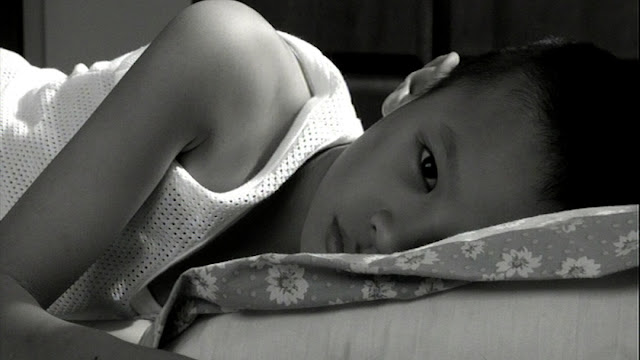Trespassed
Malaysian filmmaker Ho Yuhang hated the colour of images from digital cameras, which led him to keep his short films in black in white. Then the aesthetics of it, with the use of some lighting for accents, grew on him. Indeed, the Asian Film Archive’s showcase of Ho Yuhang’s short films under its ‘SEA of Sadness’ programme, was a study of raw emotions and a stripped-down gaze at the filmmaker’s mental notes outside his more formal genre feature-length works.
Monochrome aesthetics aside, what binds his short films is an acute sensitivity to human dialogue patterns, and the conversations we have between each other and in our heads. As I Lay Dying explores existential themes through the whimsical mind and eyes of a little boy who caught a fever in a rain. In his bed-ridden state, the boy tries to make sense of the world around him, including his visualisation of a moving ceiling, his dreams of running through the forest and seeing a lake’s reflection and his mother’s incredulous story about how he will never perish in his mother’s universe because should he die, she can always create another ‘him’ out of the same tender, loving care. In a parallel fashion, through the film’s strategically-lit monochrome mise-en-scene, we are led to make sense of the film’s tonal register as it dances between the whimsical and the minimalistic. With its sensitive touch and attention to minutiae, the film is very much an intent gaze at simple mother-child moment. But ambushed somewhere in between the childlike sensibilities of the boy, are questions about mortality that hit somewhere close to home.
As I lay dying
The second film in the collection, Open Verdict, takes the black and white aesthetics to a different tempo. A neo-noir hybrid of a thriller and comedy, the film seems genre-embracing at first glance but on closer examination reveals more of Yuhang’s mastery of dialogue. Call it uncanny timing, but the short features a group of Hong Kong policemen who receive a tip from the Malaysian police that a fugitive on the run has reached the shores of Hong Kong. On the same timeline, a man lugs an unusually heavy suitcase into a dinghy motel, that sees the unmistakable Kara Hui (on the cusp of her screen comeback) as a housekeeper nosing over the mysterious guest with her younger colleague. Shot in frames noticeably tighter than the usual crime flick, the film is low on action and high on off-tangential and perhaps intentional conversation. The policemen from both countries spend more than half their time in discussions about race and nationality with one Malaysian cop repeatedly trying to clarify to his Hong Kong peer that he is Malaysian and not Malay. Meanwhile, a bit more action takes place at the motel where the two lady housekeepers play a cat and mouse game with the mysterious guest. Sensibly-timed editing saves the film from being too pretentious and performance was rather uneven across the cast. And watching the film, one cannot stop imagining what kind of an animal the film would have become if it was filmed with a post-Golden Horse Kara Hui.
Open Verdict
Aku is a short film based on a painting, commissioned by National Gallery Singapore. Five award-winning Southeast Asian directors were asked to produce an omnibus called Art Through Our Eyes, in which they were asked to base a short film on a painting. Malaysian artist Latiff Mohidin’s work Aku is a portrait of Indonesian painter Chairil Anwar. In Yuhang’s film, a soldier finds himself lost in an unfamiliar field in the middle of nowhere and a stranger comes to his memory’s rescue. Made in the style of pre-WWI silent films, the film assumes the hybrid look of a 60s Cathay-Keris film set in a kampung with undertones of an Antonioni-esque surrealism. Unfortunately, it was hard to see much beyond the film’s borrowed stylistics but perhaps one needs to gain a better appreciation of Aku on canvas to see the true colours, pardon the pun, in Aku on screen.
Because the fifth film in the retrospective faced hurdles in its rating process, the screening stopped at the fourth film, which dug deep in the hearts of the audience and left a gaping wound. Trespassed which won the FT/OppenheimerFunds Emerging Voices award, is a harrowing tale of loss, grief and what ifs, anchored by the actress with the Midas touch Yeo Yann Yann. Reprising tropes of mother-child relationships and sharing of pillow space, as seen in As I Lay Dying, Trespassed seems like an updated version of the earlier short but with a darker turn. A young girl, overcome by the disappearance of her father, lapses into a semi-vegetative and possessed state. The film then follows her mother on a desperate journey of exorcism, from the church to the village bomoh. A less nuanced film than As I Lay Dying, Trespassed employs the monochrome aesthetics to a different effect - emotional rawness. Taking us on a linear narrative journey from love to loss to lunacy, the film grips you by the invested performances of the mother-daughter leads. Yeo Yann Yann has mastered the art of playing the troubled mum to perfection so much that anything less than her presence, this film may not hold its weight. The film also enthralls us with bits of genre-ambiguity on its edges, beguiling us with the mystery behind the girl’s ill state, a touch of satire in church, a touch of horror with the bomoh and a whiff of fantasy for closure.
Review by Jeremy Sing


